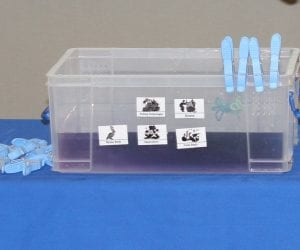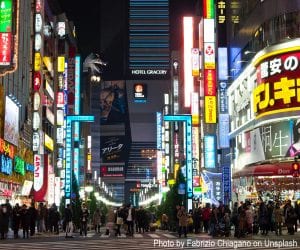The World of 7 Billion student video contest is back, and the topics for 2016-2017 are: Climate Change, Ocean Health, and Rapid Urbanization. In preparation for creating their videos, students may consider reading some contemporary books as part of their research to explore the issues.
Climate Change
This topic is wide-ranging, with a lot of different areas to explore: Changing weather patterns and weather events, ecosystem disruption, the impact a changing climate has on agriculture, coastal cities, and the impacts of climate change on human health.
- How We Know What We Know About Our Changing Climate: Scientists and Kids Explore Global Warming by Lynne Cherry and Gary Braasch
A middle school level book that takes a closer look at all the ways our climate is changing and the response from the environment – bird migrations, weather patterns and other clues that can help to identify where and how our climate is changing. - Storms of My Grandchildren: The Truth about the Coming Climate Catastrophe and Our Last Chance to Save Humanity by James Hansen
A non-fiction book from Dr. James Hansen, director of the NASA Goddard Institute for Space Studies. In this book, Dr. Hansen looks at both the currently changing climate and the threats climate change poses in the future, and points to specific political and social responses in the last 15 years.
Ocean Health
In researching this topic, students can explore the harmful effects of coral bleaching and dead zones have on ocean environments, and the resulting habitat loss. Students can look into climate regulation initiatives at local and national levels, or identify effects of water pollution and overfishing in the oceans.
- A World Without Fish by Mark Kurlansky
A non-fiction book that incorporates both a narrative account and illustrations that highlight what is happening to the world’s oceans and fish species, especially common fish that we eat, and the domino effect the loss of these fish species from the oceans would have. - Nobody Particular: One Woman’s Fight to Save the Bays by Molly Bang and Diane Wilson
A non-fiction picture book for middle school students about a shrimper in Texas who discovers that chemical plants in her state give out more pollution than in any other state, she decides to stop them. The book highlights what citizens can do to take a stand – lobbying, protesting, and writing to make a difference in her community.
Rapid Urbanization
This topic covers a lot of ground with plenty of different issue areas that students can research, including sanitation matters and the effects on both air and water quality. Other areas to look into are the formation of megacities, slums and informal settlements and the influences of migration.
- Losing It All to Sprawl: How Progress Ate My Cracker Landscape by Bill Belleville
The author, Bill Belleville, writes about losing his idyllic farmhouse and neighborhood to suburban sprawl – the development of a shopping mall. In his book, he highlights the history of Florida, noting the impacts that sprawl has on the community, nature and the environment, through history, up until today where the societal impact of losing a unique neighborhood (his) is brought into light. - Coyote at the Kitchen Door: Living with Wildlife in Suburbia by Stephen DeStefano
A biologist/conservationist examines the impact urban sprawl has on wildlife and what happens when human living spaces encroach on wildlife habitats. He discusses the impacts on the habitats in terms of light pollution, the danger of highways, hunting grounds that are now people’s backyards, and the effects on both wildlife and humans. - Favela: Four Decades of Living on the Edge in Rio de Janeiro by Janice Perlman
The author takes readers inside Favelas (slums settlements) in Rio de Janeiro to explore life inside. Through interviews of longtime Favela residents, identifying the factors of life inside a Favela – educational opportunities, job prospects, violence and drug trades, she paints a picture of life in a Brazilian Favela.




